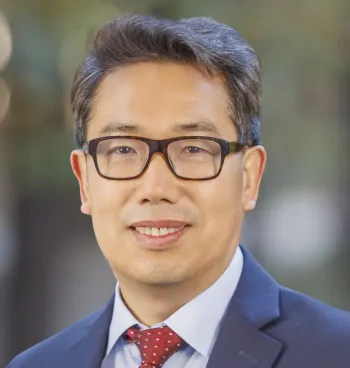
Guiting Lin, MD, PhD
Education
- MD, 1986, Weifang Medical College, Shandong, China, Medicine
- MS, 1991, Harbin Medical University, Harbin, China, Surgery
- PhD, 2001, Peking University, Beijing, China, Surgery (Urology)
Biography
Guiting Lin, MD, PhD received his medical degree at the Weifang Medical College in Shandong, China. Lin trained in Surgery at the Harbin Medical University in Harbin China and specialized in Urologic Surgery at Peking University, China's premier medical school located in Beijing. In 2001, Lin joined the Department of Urology as a Postdoctoral Research Fellow. He was promoted to Assistant Researcher in 2005, to Assistant Professor in 2007, to Associate Professor in 2010, and to Professor in 2010. In China Lin received numerous awards from the Shandong Ministry of Health, and Peking University. His UCSF research has also received recognition, including the 2002 Outstanding Young Researcher award and 2016 ISSM Zorgniotti-Newman Prize given by the International Society for Sexual and Impotence Research. Lin conducts research in the Urology Laboratory and has authored or co-authored over 140 publications.
Research Interests
Guiting Lin has conducted the research works to explore the effect of BDNF on the regeneration of nitric oxide synthesis (NOS) penile nerves and the neurons in the pelvic ganglia after the cavernous nerve transection in rats. The results show that the BDNF significantly enhanced the regeneration of NOS-containing fibers in the dorsal and intracavernosal nerves. It has also been found that BDNF promotes penile nerve regeneration through STAT, MAPK and PKC cellular signaling pathways in the ganglion. Meanwhile, Dr. Lin has applied the rat oligo microarray to screen differential gene related to incontinence in a rat model and the Molecular Mechanism of Female Stress Urinary Incontinence. Recently, Guiting Lin has focused on the adipose derived stem cells (ADSCs) and the application. The rat adipose stem cells (RADCs) have been studied and applied to treat stress incontinence and erectile dysfunction in rat models. The primary data is encouraging; the RADC can differentiate to smooth muscle cell, urothelium, and neuron in vivo. Also, the condition of incontinence and erectile dysfunction has been improved by the RADCs. Recently, Dr. Lin conducted researches about the activation of endogenous stem cells with Low-intensity Extracorporeal Shock Wave.
Academic Contact
415.476.3801 (Phone)
415.476.3803 (Fax)
Physical Address:
Department of Urology
533 Parnassus Ave, 2nd Floor, U212
San Francisco, CA 94134-0738
Mailing Address:
Knuppe Molecular Urology Laboratory
Department of Urology
Box 0738
University of California
San Francisco, California.94143-0738